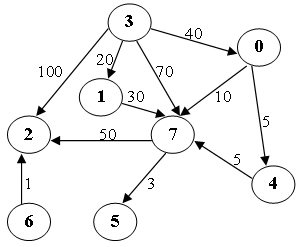Shortest Path [3](25分)
Write a program to not only find the weighted shortest distances, but also count the number of different minimum paths from any vertex to a given source vertex in a digraph. It is guaranteed that all the weights are positive.
Format of functions:
void ShortestDist( MGraph Graph, int dist[], int count[], Vertex S );
where MGraph is defined as the following:
typedef struct GNode *PtrToGNode;
struct GNode{
int Nv;
int Ne;
WeightType G[MaxVertexNum][MaxVertexNum];
};
typedef PtrToGNode MGraph;
The shortest distance from V to the source S is supposed to be stored in dist[V]. If V cannot be reached from S, store -1 instead. The number of different minimum paths from V to the source S is supposed to be stored in count[V] and count[S]=1.
Sample program of judge:
#include <stdio.h>
#include <stdlib.h>
typedef enum {false, true} bool;
#define INFINITY 1000000
#define MaxVertexNum 10 /* maximum number of vertices */
typedef int Vertex; /* vertices are numbered from 0 to MaxVertexNum-1 */
typedef int WeightType;
typedef struct GNode *PtrToGNode;
struct GNode{
int Nv;
int Ne;
WeightType G[MaxVertexNum][MaxVertexNum];
};
typedef PtrToGNode MGraph;
MGraph ReadG(); /* details omitted */
void ShortestDist( MGraph Graph, int dist[], int count[], Vertex S );
int main()
{
int dist[MaxVertexNum], count[MaxVertexNum];
Vertex S, V;
MGraph G = ReadG();
scanf("%d", &S);
ShortestDist( G, dist, count, S );
for ( V=0; V<G->Nv; V++ )
printf("%d ", dist[V]);
printf("\n");
for ( V=0; V<G->Nv; V++ )
printf("%d ", count[V]);
printf("\n");
return 0;
}
/* Your function will be put here */
Sample Input (for the graph shown in the figure):
8 11
0 4 5
0 7 10
1 7 30
3 0 40
3 1 20
3 2 100
3 7 70
4 7 5
6 2 1
7 5 3
7 2 50
3
Sample Output:
40 20 100 0 45 53 -1 50
1 1 4 1 1 3 0 3
这道题就是Dijkstra算法,是一种贪心算法,分解开来看就是从起始点开始,找离这个顶点集最近的点,然后再更新路径。
唯一有点困难的可能就是数相同的最短路径了。仔细想想,在Dijkstra过程中,这个应当是递增的,如果a到达b的路径有k条,而b能达到c,则a到c的路径也是k条,如果b到c有两条路径,则a到c的路径是k+1条。
根据这个原则,构建代码。
int known[MaxVertexNum];
void ShortestDist(MGraph Graph, int dist[], int count[], Vertex S) {
for (int i = 0; i < Graph->Nv; i++) dist[i] = INFINITY, count[i] = 0;
dist[S] = 0, count[S] = 1;
while (S != -1) {
known[S] = 1;
for (int i = 0; i < Graph->Nv; i++) {
if (!known[i]) {
if (dist[i] > Graph->G[S][i] + dist[S])
dist[i] = Graph->G[S][i] + dist[S], count[i] = count[S];
else if (dist[i] == Graph->G[S][i] + dist[S])
count[i] += count[S];
}
}
S = -1;
for (int i = 0, v_min = INFINITY; i < Graph->Nv; i++)
if (!known[i] && v_min > dist[i])
v_min = dist[i], S = i;
}
for (int i = 0; i < Graph->Nv; i++) {
if (dist[i] == INFINITY) count[i] = 0, dist[i] = -1;
}
}



 浙公网安备 33010602011771号
浙公网安备 33010602011771号